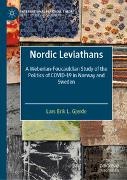Read more
This book offers a theoretical synthesis between the Foucauldian theory of power and the Weberian theory of the state. The book centres on the politics of COVID-19 in Norway and Sweden. It analyses the different tactics, strategies and rationalizations of these states to develop the theoretical framework, while using the theoretical framework to better advance our understandings of the politics of COVID-19 and how state power worked in subtle and overt, direct and indirect, ways, during this crisis. It argues that a marriage between Foucauldian and Weberian theories of the state and power engenders a holistic understanding of how power works at the microlevel and macrolevel. This invites scholars to interrogate the diverse sources of power caged within the modern state, and how these can be enacted through and over society, thereby manifesting as various mechanisms of power.
Lars Erik L. Gjerde is a Norwegian political scientist and sociologist, currently employed as a lecturer at the Department of Sociology at the University of Tromsø, Norway. He has a PhD in Political and Social Sciences from the European University Institute.
List of contents
Chapter 1: Introduction: Who Today Can Escape the Question of State Power?.- Chapter 2: The Politics of Pandemics.- Chapter 3: The Question of the State and State Power: A Weberian-Foucauldian Theory.- Chapter 4: Norwegian Leviathan Lives! Exploring the Anatomy of the Politics of COVID-19 in Norway.- Chapter 5: A Soft Leviathan? Examining the Politics of COVID-19 in Sweden.- Chapter 6: Seeing Like two States? The Political Reasoning of Hobbesian Norway and Crypto-Hobbesian Sweden.- Chapter 7: Final Reflections: On the Politics of COVID-19 and the Weberian-Foucauldian Theory of the State.
About the author
Lars Erik L. Gjerde is a Norwegian political scientist and sociologist, currently employed as a lecturer at the Department of Sociology at the University of Tromsø, Norway. He has a PhD in Political and Social Sciences from the European University Institute.
Summary
This book offers a theoretical synthesis between the Foucauldian theory of power and the Weberian theory of the state. The book centres on the politics of COVID-19 in Norway and Sweden. It analyses the different tactics, strategies and rationalizations of these states to develop the theoretical framework, while using the theoretical framework to better advance our understandings of the politics of COVID-19 and how state power worked in subtle and overt, direct and indirect, ways, during this crisis. It argues that a marriage between Foucauldian and Weberian theories of the state and power engenders a holistic understanding of how power works at the microlevel and macrolevel. This invites scholars to interrogate the diverse sources of power caged within the modern state, and how these can be enacted through and over society, thereby manifesting as various mechanisms of power.

